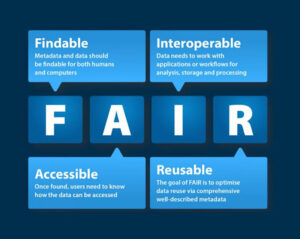
Data provenance is the record of the origin, transformation, and processing of a piece of data. It is important for maintaining the FAIR principles and supporting collaboration because it helps researchers in the following ways:
Understanding the context and history of data: This ensures the correct usage and interpretation of data.
Reproducing research results: Researchers can replicate the steps and obtain the same results by understanding the provenance of data.
Identifying and mitigating errors: Provenance helps identify errors in data and take corrective actions.
Effective collaboration: Provenance facilitates transparent and reproducible data sharing with other researchers.
Examples of how data provenance supports FAIR principles and collaboration:
Findability: Provenance helps create and maintain a data catalog with information about creators, publishers, and contributors, making it easier for researchers to find relevant data.
Accessibility: Provenance ensures that data is accessible to researchers by providing information about format, access permissions, and other requirements.
Interoperability: Provenance enhances data interoperability by providing information about structure, semantics, and relationships to other data, enabling researchers to combine and analyze data from different sources.
Reusability: Provenance makes data more reusable by providing information about creation, processing, and analysis, helping researchers understand how the data was generated and use it in their own research.
For example, a researcher training a machine learning model with data needs to understand the provenance of the data to ensure its quality, representativeness, and lack of bias. Provenance also helps identify and address data errors.
When sharing data with other researchers, it is crucial to provide them with the data’s provenance to ensure correct usage and understanding. Provenance also enables the reproducibility of data generation and obtained results.
In addition to supporting FAIR principles and collaboration, data provenance offers the following benefits:
Improved data quality: Provenance identifies and mitigates data errors, leading to higher data quality and more reliable research results.
Increased transparency: Provenance makes research more transparent and reproducible, building trust in findings and promoting scientific progress.
Enhanced collaboration: Provenance facilitates transparent and reproducible data sharing, fostering collaboration and accelerating scientific discovery.